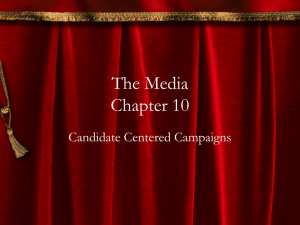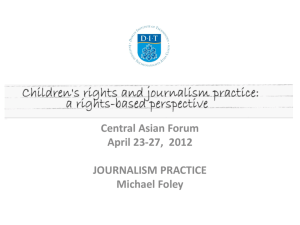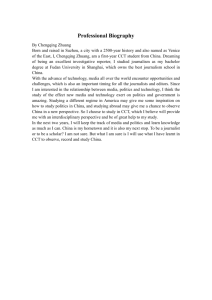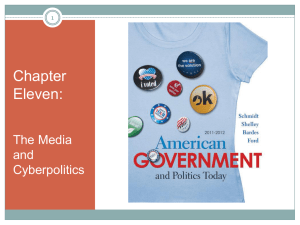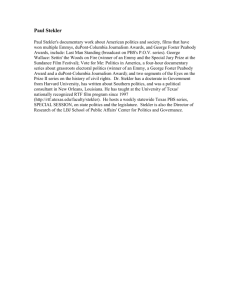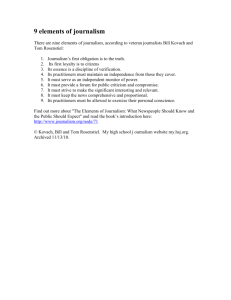JN513moduleoutline1415
advertisement
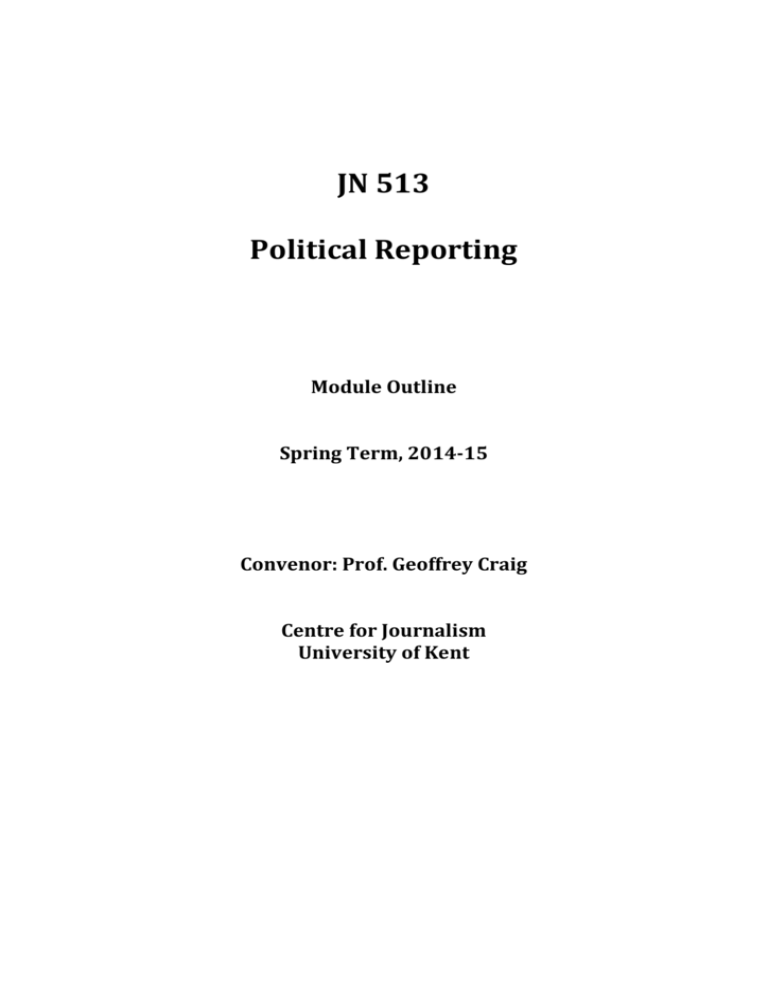
JN 513 Political Reporting Module Outline Spring Term, 2014-15 Convenor: Prof. Geoffrey Craig Centre for Journalism University of Kent Weekly Topics Week 1 Lectures Introduction to Module 2 The Journalistic and Political Fields 3 Political Source Relations 4 Governmental Communication and Political Spin 5 The Lobby and Parliamentary Reportage 6 Guest Speaker 7 Social Media and Political Reportage 8 Reporting Protests and Alternative Politics 9 Political Interviews and Press Conferences 10 Political Commentary 11 Election Reportage and Opinion Polls 12 Review of Module/Examination Preparation 2 Introduction Convenor: Prof. Geoffrey Craig g.a.craig@kent.ac.uk Gillingham building: G1-10 Phone: 01634 888987 Seminar Tuesday 2.00-4.00pm (Room G2-03) Module description This module examines the reporting practices of political journalists, the institutional contexts of political journalism, and the interactions between journalists and sources across different forms of political reportage. It assesses the power of governmental communication, and the changing nature of contemporary political journalism. Forms of political reportage that will be investigated include: parliamentary reporting, political commentary, interviews and press conferences, and the role of social media in political reportage. Aims and Objectives Aims After completing the module successfully, students will: 1. 2. 3. 4. 5. 6. Have a systematic understanding of key features of the structural relationship between the fields of politics and journalism Possess a detailed knowledge about source influence models and be able to critically evaluate debates about the merits of particular models Have a comprehensive knowledge of the recent historical evolution of governmental communication processes and parliamentary reporting practices Have a systematic understanding of how social media and the 24-hour news cycle are transforming political journalism and be able to critically assess the merits and shortcomings of such technological and economic changes in the production of quality journalism. Have detailed knowledge about language use and the exercise of power relations in interrogative encounters between journalists and politicians Possess a comprehensive knowledge of journalistic framings of leadership and public opinion in political reporting 3 7. Have a systematic understanding of the complex interplay between news and opinion in political reporting and evaluate such changes in the contexts of the contributions of journalism to the democratic health of a society. Objectives 1. To read broadly across issues relating to journalism and political reporting 2. To apply knowledge of journalism and political reporting in analyses of current political journalism 3. To develop effective research, study, and oral and written communication skills through seminar discussion and exercises, essay writing and an examination Texts There is no textbook for this module. The required readings will be provided for you. All of the required and recommended reading, where available, will be placed in the library. In addition to these readings, you should access relevant journals in the library and also use the databases available online through the University library. Some useful journals include: Journalism Studies Journalism: Theory, Practice and Criticism British Journalism Review Journalism Practice International Journal of Press/Politics Media, Culture & Society British Politics Some useful databases include: International Bibliography of the Social Sciences Web of Knowledge Nexis UK Scopus 4 Assessment Assignment Case study Essay Examination In-class participation Length 1,500 words 3,000 words 2 hours Value Due Date 20% Tuesday 7 April 40% Friday 27 February 30% 10% To be announced Weekly Case Study (20%) Due Tuesday 7 April Students are required to undertake a textual analysis of a selected example of a type of political journalism that has been covered in the module, such as a news story, column article or a broadcast interview. Your case study topic should be an individual text and your analysis must nominate your object(s) of scrutiny such as: the portrayal of politics, journalist and source relations, focus on leadership, etc. Your analysis should offer a close reading of the text, discussing language use and visual representations. Your analysis should also draw on the theoretical concepts and readings that are covered over the term. You should provide a hard copy (or link to) of your journalism text. Students must also consult with the convenor a week prior to the deadline about their selected text. Essays must be typed and double-spaced and correctly referenced. Essays must be submitted by 4 pm on the due date. All essays should demonstrate knowledge of the relevant module readings. Students are also encouraged to demonstrate evidence of extra and in-depth research. The Centre for Journalism has adopted the Harvard style and this is the style you should use in referencing your assignments. Further details can be found at: http://www.kent.ac.uk/ai/styleguides.html Please also consult the essay-writing guide at the end of this module outline. Students should consult the Assessment Criteria List before the submission of each assignment. This will be used as the basis for the marking of your assignment. Essay (40%) Due Friday 27 February You are required to write on one of the following two topics: 1. Relations between politicians and journalists can either occur as mutually beneficial exchanges of information or as vociferous contests. Evaluate the respective merits of the exchange and competitive source relation models. 5 2. Do spin doctors have too much power over political journalists? Discuss with reference to the history of governmental information management in British politics. Essays must be typed and double-spaced and correctly referenced. Essays must be submitted by 4 pm on the due date. All essays should demonstrate knowledge of the relevant module readings. Students are also encouraged to demonstrate evidence of extra and in-depth research. The Centre for Journalism has adopted the Harvard style and this is the style you should use in referencing your assignments. Further details can be found at: http://www.kent.ac.uk/ai/styleguides.html Please also consult the essay-writing guide at the end of this module outline. Students should consult the Assessment Criteria List before the submission of each assignment. This will be used as the basis for the marking of your assignment. Examination (30%) Date to be announced In the two-hour examination you will be required to answer two essay questions from a list of six questions. Seminar Participation (10%) A vital part of your learning in this module occurs through seminars. It is, therefore, crucial that you attend and participate in all classes. If you can’t make a class because you are sick please supply me with a doctor’s certificate. It is important that everyone prepares for classes by completing the reading. This leads to more interesting and informative classes. Remember that your participation mark is for participation, NOT attendance. Lecture Outlines I will provide lecture outlines under the Module Notes menu on the Centre for Journalism site. A copy of this Module Outline will also be available on the site. Media Consumption Needless to say (but I’ll say it anyway) you must regularly spend time accessing online news sites, reading newspapers, news magazines, watching television news and current affairs, and listening to the radio news and current affairs. In addition to your regular news media consumption for the course you might want to access the following sites on the news media: The Media Show on BBC Radio 4: http://www.bbc.co.uk/programmes/b00dv9hq 6 Newswatch on BBC Television: http://www.bbc.co.uk/programmes/b00qjrk2 The BBC Archives site: http://www.bbc.co.uk/archive/ The Media section of the New Statesman: http://www.newstatesman.com/media The Media section of The Guardian: http://www.guardian.co.uk/media Other Details Please come and have a chat if you are encountering any kind of difficulty that is hindering your study. If you can’t complete an assignment on time because you are sick, or because of circumstances beyond your control, then let me know before the assignment is due. You must complete all work in order to pass the module. Any student who misses a substantial portion of the module will be deemed to have not satisfactorily completed the course. Dishonesty in Assessment I regard most seriously any acts of dishonesty relating to assessment. Cheating includes plagiarism, unauthorised collaboration, examination misconduct and theft of other students’ work. Plagiarism and collusion are defined as including any of the following five types of behaviour, and apply to work in any medium (for example, written or audio text, film production, computer programs): Inappropriate/inadequate acknowledgement - material copied word-forword which is acknowledged as paraphrased but should have been in quotation marks, or material paraphrased without appropriate acknowledgement of its source. Collusion - material copied from another student’s assignment with her or his knowledge. Verbatim copying - material copied word-for-word or exactly duplicated without any acknowledgement of the source. 7 Ghost writing - assignment written by third party and represented by student as her or his own work. Purloining - material copied from another student’s assignment or work without that person’s knowledge. For more information please see: http://www.kent.ac.uk/socsci/studying/general/plagiarism.html 8 Assessment Criteria List For your essay and seminar presentation report this term make sure you adopt the following format. If you do not adopt the following format I may hand back your assignment and ask you to resubmit it after making the necessary changes. Title page Accurate page numbers Double-line spacing Is left justified Font is 12 point Assignment is securely fastened Your assignments will be assessed on both the quality of the content and on the structure and writing style of the assignment. I will use this as the basis for their marking of your assignment. Content Demonstrates depth of analysis exceeding superficial descriptions Defines key terms and provides accurate understandings of those terms Demonstrates good understanding of relevant module references and demonstrates evidence of independent research Supports theoretical discussion through reference to relevant examples Answers the question and makes conclusions based on clearly identified observations and interpretations of reference and other source material Structure and Style Progresses logically, with a coherent structure Essay written to correct word length Clearly defined introduction and conclusion Conclusion summarises main points/arguments Style is clear and consistent Sentences are complete, fluent and well-written Correct spelling, punctuation and grammar Citations and bibliography relevant and correctly referenced 9 Week 1 Introduction to Module Required reading 1. Module Outline. Recommended Internet Sites There are a multitude of interesting sites about journalism that you may wish to access during the term. To get you started, you should look at the following: https://reutersinstitute.politics.ox.ac.uk http://www.poynter.org http://www.cjr.org/index.php http://www.niemanlab.org http://www.pressgallery.org.uk 10 Week 2 The Journalistic and Political Fields Required reading 1. Davis, A & Seymour, E 2010, ‘Generating forms of media capital inside and outside a field: the strange case of David Cameron in the UK political field’, Media, Culture & Society, vol. 32, no. 5, pp. 739759. Recommended reading 1. Benson, R & Neveu, E 2005, (eds.) Bourdieu and the Journalistic Field. Polity, Malden. 2. Boussofara-Omar, N 2006, ‘Learning the “linguistic habitus” of a politician: A presidential authoritative voice in the making’, Journal of Language and Politics, vol. 5, no. 3, pp. 325-358. 11 Week 3 Political Source Relations Required reading 1. Stromback, J & Nord, L. W 2006, ‘Do Politicians Lead the Tango? A Study of the Relationship between Swedish Journalists and their Political Sources in the Context of Election Campaigns’, European Journal of Communication, vol. 21, no. 2, pp. 147-164. Recommended reading 1. Broersma, M, den Herer, B & Schohaus, B 2013, ‘A Question of Power: The changing dynamics between journalists and sources’, Journalism Practice, vol. 7, no. 4, pp. 388-395. 2. Davis, A 2003, ‘Public Relations and News Sources’, in: S. Cottle (ed.) News, Public Relations and Power, Sage, London. 3. Wolfsfeld, G 2003, ‘The Political Contest Model’, in: S. Cottle (ed.) News, Public Relations and Power, Sage, London. 4. Ross, K 2010, ‘Danse Macabre: Politicians, Journalists, and the Complicated Rumba of Relationships’, The International Journal of Press/Politics, vol. 15, no. 3, pp. 272-294. 5. Brants, K, de Vreese, C, Moller, J, and van Praag, P 2010, The Real Spiral of Cynicism? Symbiosis and mistrust between politicians and journalists’’, International Journal of Press/Politics, vol. 15, no. 1, pp. 25-40. 12 Week 4 Governmental Communication and Political Spin Required reading 1. Gaber, I 2000, ‘Government by spin: an analysis of the process’, Media, Culture & Society, vol. 22, pp. 507-518. Recommended reading 1. Sanders, K 2009, ‘Communicating Government’, in: Communicating Politics in the Twenty-First Century, Palgrave Macmillan, Basingstoke, Hampshire, pp. 73-91. 2. Moloney, K 2001, ‘The rise and fall of spin: Changes of fashion in the presentation of UK politics’, Journal of Public Affairs, vol. 1, no. 2, pp. 124-135. 3. Oborne, P 1999, Alastair Campbell: New Labour and the Rise of the Media Class, Aurum Press, London. 4. Ward, I 2003, ‘An Australian PR state?’, Australian Journal of Communication, vol. 30, no. 1, pp. 25-42. __________________________________________________________ 13 Week 5 The Lobby and Parliamentary Reportage Required reading 1. Gaber, I 2009, The slow death of the Westminster Lobby: Collateral damage from the MPs’ expenses scandal’, British Politics, vol. 4, no. 4, pp. 478-497. Recommended reading 1. Davis, A 2007, ‘Mediated Politics: the mediation of parliamentary politics’, in: The Mediation of Power: A Critical Introduction, Routledge, Oxford. 2. Hencke, D 2009, ‘Why a Commons Club fouled up’, British Journalism Review, vol. 20, no. 3, pp. 51-55. 3. Franklin B 1997, ‘From the gallery to the gutter: Changing newspaper reporting of parliament’, in: Newszak & News Media, Arnold, London. 4. Negrine, R 1996, ‘Reporting Parliament, Reporting Politics’, in: The Communication of Politics, Sage, London. 14 Week 6 Guest Speaker 15 Week 7 Social Media and Political Reportage Required reading 1. Chadwick, A 2011, ‘The Political Information Cycle in a Hybrid News System: The British Prime Minister and the “Bullygate” Affair’, International Journal of Press/Politics, vol. 16, no. 1, pp. 3-29. Recommended reading 1. Davis, A 2007, ‘New and alternative media: the Internet and the parliamentary public sphere’, in: The Mediation of Power: A Critical Introduction, Routledge, London. 2. Fenton, N (ed.) 2010, New Media, Old News: Journalism and Democracy in the Digital Age, Sage, London. 3. Chadwick, A 2013, The Hybrid Media System: Politics and power, Oxford University Press, Oxford. 16 Week 8 Reporting Protests and Alternative Politics Required reading 1. Cottle, S 2006, ‘Reporting Demonstrations and Protest: Public Sphere(s), Public Screens’, in: Mediatized conflict: developments in media and conflict studies Open University Press, Berkshire, pp. 3345. Recommended reading 1. Sanders, K 2009, ‘Communication in Opposition, Protest and Violence’, in: Communicating Politics in the Twenty-First Century, Palgrave Macmillan, Basingstoke, Hampshire, pp. 92-107. 2. Cottle, S & Lester, L (eds.) 2011, Transnational Protests and the Media, Lang, New York. 17 Week 9 Political Interviews and Press Conferences Required reading 1. Craig, G 2013, ‘How does a Prime Minister Speak? Kevin Rudd’s discourse, habitus and negotiation of the journalistic and political fields’, Journal of Language and Politics, vol.12, no. 4, pp. 485-507. Recommended reading 1. Craig, G 2008 ‘Kevin Rudd and the Framing of Politics and Political Leadership in News Media Interviews’, Communication, Politics and Culture, vol. 41, no. 2, pp. 84-99. 2. Clayman, S & Heritage, J 2002, ‘The news interview in context: institutional background and historical development’, The News Interview: Journalists and Public Figures on the Air, Cambridge University Press, Cambridge. pp. 26-56. 3. Seymour-Ure, C 2003 ‘Prime Ministers and Press Conferences’, Prime Ministers and the Media: Issues of Power and Control, Blackwell, Malden, MA, pp. 169-202. 18 Week 10 Political Commentary Required reading 1. Hobsbawm, J & Lloyd, J 2008, The power of the commentariat, Editorial Intelligence and Reuters Foundation. Recommended reading 1. Kroon Lundell, A, & Ekströ m, M 2013, ‘Interpreting the News: Swedish correspondents as expert sources, 1982-2012’, Journalism Practice, vol. 7, no. 4, pp. 517-532. 2. Sanders, K 2009, ‘Political News and Comment’, in: Communicating Politics in the Twenty-First Century, Palgrave Macmillan, Basingstoke, Hampshire, pp. 201-221. 3. Salgado, S & Stromback, J 2012, ‘Interpretive Journalism: A review of concepts, operationalizations and key findings’, Journalism, vol. 13, no. 2, pp. 144-161. 19 Week 11 Election Reportage and Opinion Polls Required reading 1. Stromback, J 2009, ‘Vox Populi or Vox Media? Opinion Polls and the Swedish Media’, Javnost: The Public, vol. 16, no. 3, pp. 55-70. Recommended reading 1. Brettschneider, F 2008, ‘The News Media’s Use of Opinion Polls’, in: W. Donsback & M. W Traugott (eds.) The SAGE Handbook of Public Opinion Research, Sage, Los Angeles, pp. 479-486. 2. Tuman, J. S 2008, Political Communication in American Campaigns, Sage, Thousand Oaks, CA. 3. Sanders, K 2009, ‘Political Campaigns’, in: Communicating Politics in the Twenty-First Century, Palgrave Macmillan, Basingstoke, Hampshire. 20 Week 12 Review of Module/Exam Preparation 21 Essay Writing Guide PLANNING • Plan your essay. Sit down and break your argument into the five or six points you’ll be discussing. Once you’ve got a broad plan, order your notes in relation to each specific topic. INTRODUCTION • The introduction to your essay should be one paragraph in length. • Outline your argument and your method: • Make reference to the topic and indicate your own stance or approach to it • Summarise the main points you will expand upon and illustrate in the body of your essay • Do not include examples and illustrations at this point. PARAGRAPH STRUCTURE • • • • A paragraph should begin with a topic sentence - stating the main idea of the paragraph. However, do not write: “In this paragraph I am going to talk about . . .” Rather, begin along the lines of: “In the last few years the media has become increasingly obsessed with celebrity.” Sentences are then added to explain, qualify, illustrate and develop the main point. “Only last week, for example, David Beckham’s love life made headline news.” Most paragraphs are between 3-10 sentences: one sentence is not a paragraph. A typical structure for a paragraph would be: – topic sentence – further explanation and qualification – illustration/examples – discussion and analysis of examples. LINKING PARAGRAPHS • • Each paragraph should follow logically from the one before. Each paragraph introduces a new idea (with a new topic sentence) but is clearly related to the ones before and after. QUOTATIONS • Do not let quotations do your arguing for you. A quotation is to support your own points. Do not use the quotation to simply repeat a point you have just made. Do not simply paraphrase quotations. 22 • • • • • You should not follow quotations directly one after the other with no discussion. Short quotations, less than three lines or 50 words, are put in quotation marks. Longer quotations should be indented. Do not use quotation marks and place the page reference after the full stop. Be careful when incorporating quotations into your own sentence. If the quotation is placed within the sentence it is tidier to place the reference at the end. When citing a text, place in brackets the surname of the author(s) followed by the date then a comma and the page number e.g. (Jones 1999, p. 23). The surname refers the reader to the bibliography at the end of the essay. CONCLUSION • • In the last paragraph of your essay you should briefly summarise your argument. Do not bring in any new material and try not to make grand claims and broad generalisations. Sometimes a conclusion will indicate further research that could be undertaken following this research. REFERENCES • • • • The Centre for Journalism has adopted the Harvard style and this is the style you should use in referencing your assignments. Further details can be found at: http://www.kent.ac.uk/ai/styleguides.html There is no specified number of references that are required but you have been asked to draw on the relevant unit readings and also demonstrate evidence of independent research. The most important criterion is not a lengthy references list but a well-argued essay. OTHER WRITING TIPS 1. In academic essays do not contract verbs – e.g. use “do not” rather than “don’t.” 2. Do not split infinitives, e.g. ‘to run’ with an adverb. The infinitive should stay together ‘to run quickly’ rather than apart ‘to quickly run.’ 3. Try not to end sentences with prepositions, this can sound clumsy, e.g. ‘The tutorial is where I got it from.’ ‘The media badly handled it.’ 4. An apostrophe is used to signal the possessive e.g. ‘Geoff’s tutorial.’ 5. Do not abbreviate proper names and places, e.g. The United States rather than the US. etc. 6. Always italicise the titles of newspapers, books and magazines, e.g. The New York Times, Media and Politics, The Listener. 23 7. Try to be analytical rather than descriptive. Conventional academic writing employs third person address but I do not mind if you use first person address. 8. Refrain from writing in general terms. Write about specific ideas and examples from the text(s). A reader will look for close analysis/reading of the article, book or news story. 9. Rhythm – language is rhythmic; you will know if a sentence is not quite right by the way it sounds. It is a good idea to read your essay back to yourself. 10. Re-drafting. Go back over your essay and reconsider the paragraph and sentence structures. Is it possible to restructure a sentence to clarify the meaning of the sentence? Can the sentence be written more concisely? Is the spelling and punctuation correct? 11. Write to the required length. Plus or minus 10% of word length is OK. 24
